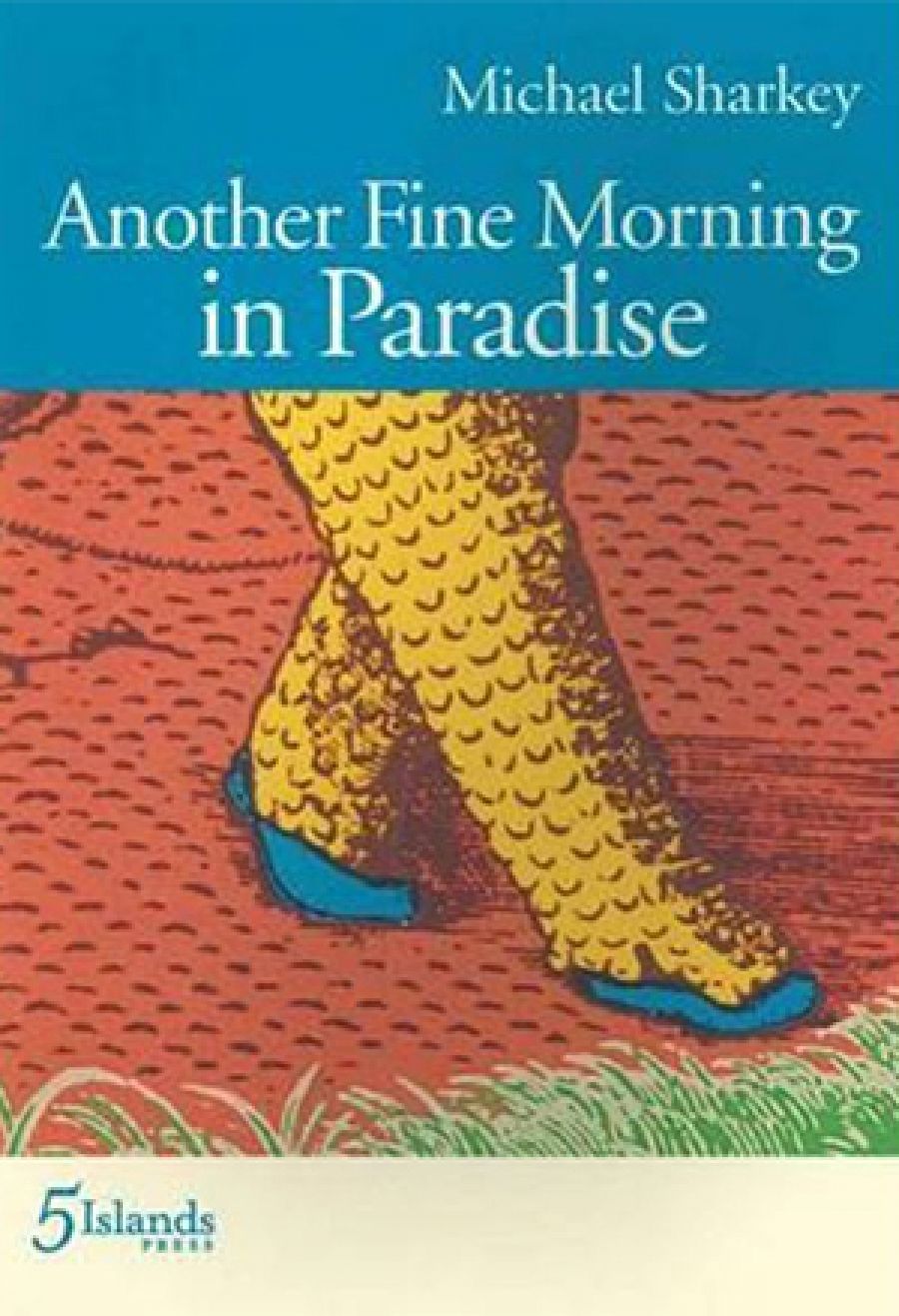
- Free Article: No
- Contents Category: Poetry
- Review Article: Yes
- Online Only: No
- Custom Highlight Text:
The variety of Australian poetry is attested to by books such as Another Fine Morning in Paradise. Neither entirely fish nor fowl, it is by turns satirical, watchful, effusive, and lyrical. Its central preoccupation is with a sharp-eyed scrutiny of what might be called the-idea-of-a-better-life ...
- Book 1 Title: Another Fine Morning in Paradise
- Book 1 Biblio: 5 Islands Press, $24.95 pb, 100 pp, 9780734047458
The volume begins with a poem entitled ‘The Garden of Earthly Delights’, which explores the thesis that human beings are uncomfortable when satiated and ‘free of purpose’ – so much so that they ‘took a vote and ended this’. The sequence that follows, ‘The Plain People of Paradise’, deconstructs in often acerbic poems various ways of construing, imagining, or envisioning the paradisal: ‘Who stores the missing limbs and faculties / so kids who lob from Laos, Soudan, Serbia / and elsewhere get to use their feet again?’ (‘Housekeeping’). Under scrutiny, too, are some of the extraordinary claims human beings make for their own kind, such as in hagiographies – ‘Hubert of Liège must be as busy as a one-armed / paperhanger with the crabs’ (‘Multitasking’) – and, more generally, the widespread human urge to find transformative satisfactions in personal and social rituals, such as those surrounding marriage: ‘Who’s in charge of newlyweds and joy? / How can the bureaucrats endure the endless schmaltz?’ (‘Office Management’).
There are some imaginative, almost surrealistic Lewis Carroll-like touches in this sequence, such as in ‘The Playing Fields of Aalu’, where we find ‘a bird / that was human but chose to fly’ and ‘a chess piece / changing its colour and shape’. There are also some challenging ideas about what we might gain and lose in any afterlife: ‘No one here can speak with any certitude of knowing / who she was. Best thing of all. People used to seeing / through glass darkly know their names forever written / in the register of light […] they have forgotten all dilemmas, / live content with all enigmas’ (‘The Guided Tour’). Further, Sharkey comments on the way in which those who believe that they will achieve a contented afterlife frequently consign others to less happy destinations: ‘What use is / Heaven if the ones refused admission / can’t be sent to some Nauru or Christmas Island / of the damned to keep the ignorant in bliss?’ (‘“Sort after” Neighbourhood’).
In the long second section of the volume entitled ‘Life in Common’, a miscellaneous series of observant, sometimes reflective, and occasionally personal poems, Sharkey turns his attention to ideas and things that most of us encounter – tea towels and stories of infidelity, anger, the sight of blood, insomnia, celebrity, Romanticism and Modernity, parenting, and superstition. One of these poems, ‘Ode to Shoes’, is a reflection on the variety of places that shoes will take us – an entertaining anatomy of the world viewed from below. ‘Ancestors in Nineteenth-Century Albums’, a finely controlled three-part poem, pithily captures the strangeness of the ‘stiff-backed’ postures from nineteenth-century photographs and creates brief, pointed, and sometimes poignant narratives around images of a great-aunt and great-grandparents, among others.
The poetic sequence ‘The Custom of Cockaigne’ returns to the theme of unsatisfactory or tarnished paradises that opens the volume. Sharkey transports this medieval, mythical land of plenty to contemporary Australia: ‘This could be a pit stop on a highway, but another / blink unseals the world inside: as if a dream of anaesthesia / were as real as what we see. The Mall’s a paradise of buskers / singing songs of somewhere else, unhappy land’ (‘best state of all’). The knowing voice and terse, sometimes colloquial tone is characteristic of the whole sequence. It is as if Sharkey wants to spotlight his quarry and keep it there – as a subject for his humour, commentary, and occasional castigation.
He also frequently comments on urban and suburban development; his sympathies are generally with the poor and dispossessed. The poetry consistently delves into ideas of political and social justice, and explores the corruption and self-serving neglect of those in positions of power, pointing out how often people fall short of, and neglect, their loftier responsibilities, claims, and aspirations.
There is also a kind of puzzling-out, as if Sharkey is generally sceptical about how we characterise who we are, what we do, and even what the ‘real’ might be. ‘The Superheroes in Old Comics’ states this succinctly: ‘Families are dysfunctional in here. / It’s like real life, whatever that is.’ These lines are one measure of Sharkey’s ironic and sometimes jaundiced view of modernity. In this instance, his claim seems to be that comics, in all their strangely dimensioned weirdness, are more like ‘real life’ than we might imagine. In suggesting this he asks how, after all, we should characterise life as we know it, thus turning his comic book vision of superheroes back as a question to the reader.
Overall, this volume of poetry offers a critique of modernity and many of its values, while providing diverse visions of the world. Some of these visions are familiar enough, such as in the poem ‘The Story of My Life’ – in which the protagonist loses years of computer files – but it is characteristic of Sharkey to make something quirky out of such a common catastrophe. Having finally got his files back, the protagonist questions, ‘“Why this farce” […] and dragged that world into the trash’.


Comments powered by CComment